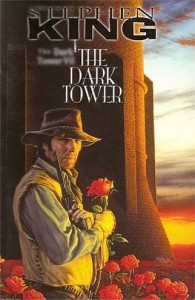
I love to read. I’ll read almost anything. I tend to lean towards science fiction and fantasy, but I love non-fiction as well. I’ll give anything a whirl. Because I read so much, though, I’ve gotten pretty good at it. I can plow through a book quickly enough that my wife is sometimes skeptical I’m actually reading.
Because of this, I tend to lean towards series (and comic books, but that’s another matter). When each new book comes out, I usually will take time before the release date to reread earlier books. This forces me to re-appreciate the author’s work, and pick up things I might have missed the first time. For too long I viewed books as things to be conquered, challenges to be overcome. Finishing a book was an accomplishment.
That is, until The Dark Tower.

If you haven’t read Stephen King’s magnum opus, then you might not understand. I picked up the first book in the series in 1988, when I was 15 years old. It’s not terribly long, and it was a quick read, but the story was obviously going to be huge. I couldn’t wait to see what came next. Book two came out a year later, when I was 16. New characters were introduced, and the breadth of the story widened considerably. Book three came out a couple years later, in 1992. By that time, I was in college. I think I plowed thro ugh that book in a weeekend, stopping only to go out with friends, obviously. That one ended on a cliffhanger, so I found myself eagerly awaiting the next.
Book four was released in 1997. I was 25, I’d just bought an engagement ring for my future fiance, and was in my last year of medical school. Mr. King thought the series would go seven books, so I was over the hump. I still had no idea where we were going, but I couldn’t wait to get there.
Then, in 1999, Stephen King was almost killed in a car accident. I remember being horrified at the tragedy, but I’d be lying if I said that the first thought that went through my mind wasn’t that I wouldn’t get to finish The Dark Tower. I worried that if the books weren’t finished, or more to the point, if I weren’t able to finish them, that something would be lacking from my life.
Evidently, I wasn’t the only one who had such concerns. Even Mr. King was worried about this. Book five was published in 2003, after we had moved to Indiana. Books six and seven were both published in 2004. I bought the last book when I was 32 years old.
I’d read and reread those books so many times I knew parts by heart. And when I finally had the last book in my hands, I started reading as fast as my eyes could move. I was hellbent on finishing it. So much so, that as Roland entered the Dark Tower on page 802, I turned the page so hard I almost ripped it. And then I came upon the most remarkable thing. There was a “Coda“.
The story stopped. Stephen King began talking as an author to a reader. It was as if he had closed the book he was reading out loud, and peered over his glasses to address me directly. He said that he was satisfied, the story had gone far enough. He said that he knew most of us would want more, would demand more. We wanted the end:
I’ve told my tale all the way to the end, and am satisfied. It was (I set my watch and warrant on it) the kind only a good God would save for last, full of monsters and marvels and voyaging here and there. I can stop now, put my pen down, and rest my weary hand (although perhaps not forever; the hand that tells the tales has a mind of its own, and a way of growing restless). I can close my eyes to Mid-World and all that lies beyond Mid-World. Yet some of you who have provided the ears without which no tale can survive a single day are likely not so willing. You are the grim, goal-oriented ones who will not believe that the joy is in the journey rather than the destination no matter how many times it has been proven to you. You are the unfortunate ones who still get the lovemaking all confused with the paltry squirt that comes to end the lovemaking (the orgasm is, after all, God’s way of telling us we’ve finished, at least for the time being, and should go to sleep). You are the cruel ones who deny the Grey Havens, where tired characters go to rest. You say you want to know how it all comes out. You say you want to follow Roland into the Tower; you say that is what you paid your money for, the show you came to see.
I hope most of you know better. Want better. I hope you came to hear the tale, and not just munch your way through the pages to the ending. For an ending, you only have to turn to the last page and see what is there writ upon. But endings are heartless. An ending is a closed door no man or Manni can open. I’ve written many, but most only for the same reason that I pull on my pants in the morning before leaving the bedroom – because it is the custom of the country.
And so, my dear Constant Reader, I tell you this: You can stop here. You can let your last memory be of seeing Eddie, Susannah, and Jake in Central Park, together again for the first time, listening to the children’s choir sing “What Child is This”… That’s a pretty picture, isn’t it? I think so. And pretty close to happily ever after, too. Close enough for government work, as Eddie would say.
Should you go on, you will surely be disappointed, perhaps even heartbroken. I have one key left on my belt, but all it opens is that final door, the one marked THE END. What’s behind won’t improve your love-life, grow hair on your bald spot, or add five years to your natural span (not even five minutes). There is no such thing as a happy ending. I never met a single one to equal ‘Once upon a time.’
Endings are heartless.
Ending is just another word for goodbye.
I could see that the story continued, for those that wanted to go on. But I didn’t. Instead I reread the above and stared at it for some time. Then I closed the book. I felt that I owed it to Mr. King; I had to consider his request, at least.
Think about where I was for a second. I was consuming the books as fast as anyone possibly could, and it still took me 16 years to finish them. I went from a young teenager to a 32 year old man with two kids and a third being considered. I had, at the time, spent half my life reading The Dark Tower. And after all that, all I could think about was how it ended? Is that what really mattered?
I forced myself not to finish the story. Instead, I thought about how much I had grown and changed while I enjoyed it. I remembered reading it at camp, at home, at college, in medical school, and finally as my son napped beside me. I found that my enjoyment of the story, and my life, did not lessen one bit for not knowing what happened to Roland in the Tower.
I’ll admit that I went back later, and finished the book. To be honest, I had sort of predicted the final bit, much as I liked it. But Stephen King succeeded. In all the times I’ve talked to others about the series, I have never discussed the ending. I don’t care. What mattered, and what people who have read the book care about, was what happened before the ending.
But still, what I think about most is the coda. He changed the way I think about books and reading. I’ve learned to slow down and think about the story. I’ve learned to appreciate the journey, and focus not so much on the ending.
It was because of The Dark Tower that I loved the finale to the Sopranos, when the screen goes blank and refuses to say what happens next. It’s because of The Dark Tower that I didn’t care about the epilogue at the end of The Deathly Hallows, because no matter how much J.K. Rowling tells us about Harry, there will be more life left for him to live in my imagination. But more important, it’s because of The Dark Tower that I tell my kids that the fun part of the game is the playing, not the winning. It’s why I will now put down a book mid-stream and walk away, only to come back to it later when I’m more focused. It’s why I think a lot about enjoying the ride instead of anticipating the end.
It’s because of The Dark Tower that I really recognize that it is about the journey, not the destination – not just in books, but in life as well. I can’t describe how grateful I am for that.
AEC

